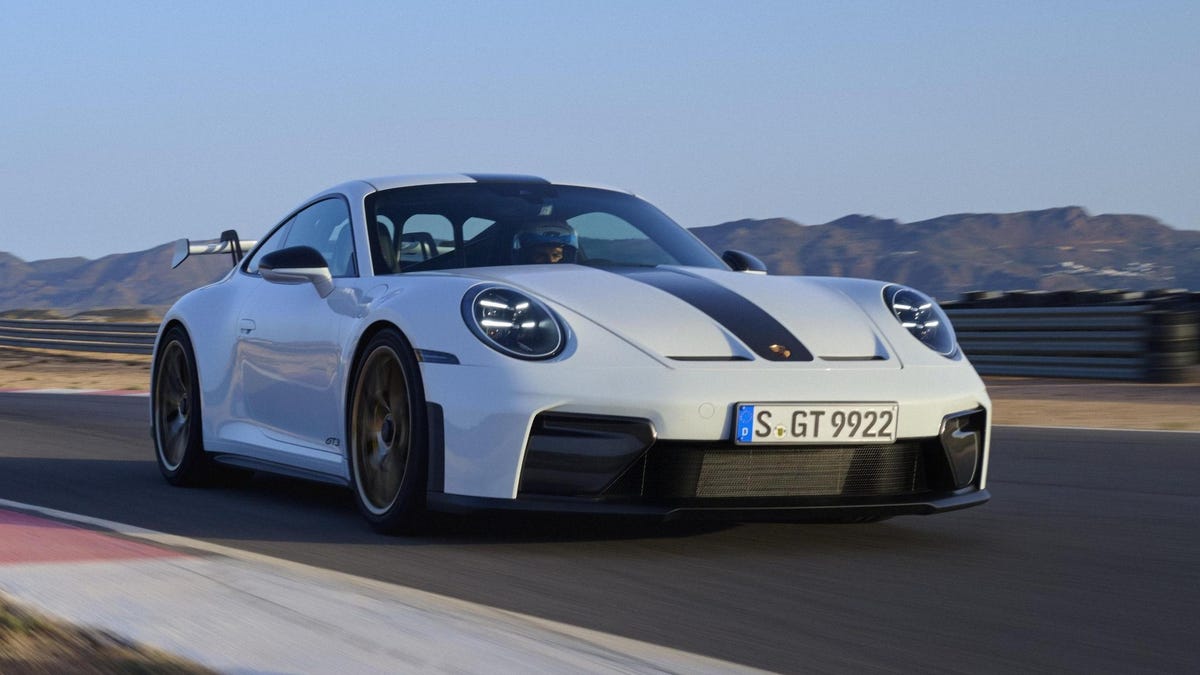The naturally aspirated 4.0-liter flat-six motor that powers the Porsche 911 GT3 probably isn’t very long for this world in its current form. Speaking with Autocar, Porsche GT boss Andreas Preuninger said that in just two year’s time, the 502-horsepower motor that has powered the GT3 and other Porsche sports cars since 2018 would need to either gain turbochargers or some sort of hybrid component to meet emissions standards.
Right now, it’s one of only two motors built by Porsche that doesn’t have a turbocharger or a hybrid element. As it turns out, the other motor is the 4.0-liter flat-six that is found in the Cayman and Boxster GTS 4.0 models. Preuninger says the NA 4.0 is going away because, in a few years, it’s not going to be able to comply with Euro 7 emission standards that take effect in 2026. Maybe that means the motor will live on in its current form in the land of the free, but it’ll be some time before we know for sure.
Here’s more of what Preuninger told Autocar, and why he’s not worried about the GT3 losing its naturally aspirated signature:
“It could live forever without the laws coming,” he told Autocar, referring to new Euro 7 standards, effective from 2026. “I don’t think we can handle Euro 7 without electrification or without turbos. [As it stands] we can sell this car for another two years, but it depends on the markets.”
[…]
One solution would be to switch the GT3 to a variation of the new hybrid system used by the 911 GTS. This draws power from a 3.6-litre turbocharged engine paired with a gearbox-mounted electric motor to make 473bhp. Rivals from Lamborghini and Ferrari all now use turbocharged engines or hybrid set-ups.
However, Preuninger suggested the two cars have different use cases that require different powertrains. He said: “For the GTS, this is a great [set-up]. In straight-line performance, it’s as fast as a GT3 and maybe even quicker off the line.
“But I couldn’t care less: for a GT3, a straight is the connection between two curves. “The system itself is the right approach to put electrification in a sports car, but there’s a reason we don’t use that on a GT3. We would have had to use the PDK II – the gearbox we have in the standard Carrera, which is more than 20kg heavier than our ‘Sport’ PDK.”
It was apparently even a struggle to keep the current motor in compliance with Euro 6 regulations. Preuninger talked about what engineers had to do to make that motor work with today’s laws and still produce over 500 horsepower. From Autocar:
“The new car is Euro 6 ‘AP’ [compliant, so with] a third less nitrous oxides, 40% less particulate emissions – this was the biggest challenge, to keep 9000rpm and the [same] power, and to stay away from turbocharging and electrification, because we know that’s not what the customer wants – and it adds weight to the car at the wrong end of the car, at the back.
“So we’d rather cut the final drive ratio to make the car a little more lively, instead of making the car heavier and not puristic.”
He also hinted at the return of the 911 GT2 but said the prototype that has been seen running around the Nürburgring was just a concept car. He did say his “absolute inner wish” is to build a new GT2 RS, but it isn’t going to be around “in the next couple of months,” Autocar reports.
As always, there’s a lot to look forward to at Porsche, and while some folks will bemoan the fact the GT3 will lose its pure naturally aspirated goodness, a couple of turbos or a 48-volt hybrid system isn’t going to spell doom for the car.

